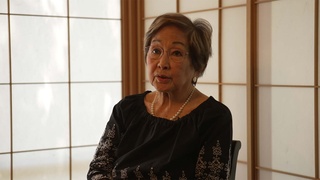Interviews
Results of being more American than Japanese
I think, one of the disadvantages of trying to become so American was that—in my case—it created a chasm between, let’s say, me and my mother. I wanted her very much to learn English, but she was so busy taking care of us and helping to work and it was hard for her to take any time to learn English. She did the best… she was so dear.
She would come to the PTA [Parent Teacher Association] meetings not knowing what was going on at all, but just to show up because I said [to her], “The more parents who come to these PTA meetings, our homeroom will get a prize, some kind of honor.” So even though she had no knowledge [of English and] or did not understand what was going on, she would dress up, put on a hat and come to the PTA meetings. I didn’t try hard enough to learn Japanese in order to be closer to her. That’s the biggest regret of my life.
Date: August 26, 1998
Location: Virginia, US
Interviewer: Darcie Iki, Mitchell Maki
Contributed by: Watase Media Arts Center, Japanese American National Museum





